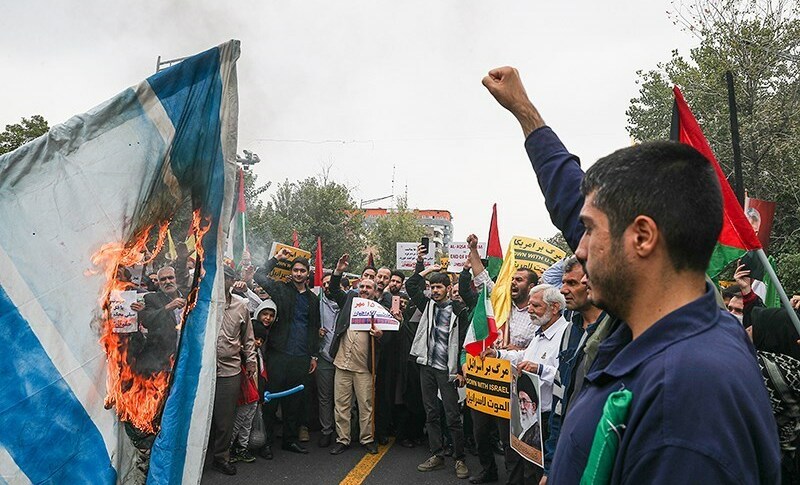How the Israel-Hamas War Is Changing the World
The Israel-Hamas war in Gaza has commanded global attention for over two months. Why is this war important to watch? How is it changing our world today?

It’s been over two months since Hamas breached the Gaza security fence and perpetrated the worst massacre of Jews since World War II. Israel has reacted to the atrocities with a commitment to eradicate Hamas and its infrastructure to prevent this kind of attack from ever occurring again.
While the primary battleground is in the Gaza Strip, this war is having repercussions and effects around the globe.
This blog post will examine four significant regions of the world and how this war is impacting each. We’ll also consider how these events fit into end-time Bible prophecy.
The Middle East
In the weeks since Israel launched its retaliatory war against Hamas, most Muslims in the Middle East have viewed the Palestinians as victims and Israel as the aggressor. This view has ignited anti-Israel protests and anti-Semitism that, in many cases, had already been simmering under the surface throughout the Middle East.
An anti-Israel protest in Tehran, Iran, on Oct. 14, 2023 (Amin Ahouei/TasminNews via Creative Commons). 
In addition to Hamas, Iran also sponsors Hezbollah in Lebanon, militias in Syria and the Houthis in Yemen.
Though some Arab nations have recognized and made peace with Israel through the Abraham Accords, Bible prophecy shows that these nations will ultimately form a confederacy to destroy the Jewish state (Psalm 83:1-8).
Bible prophecy shows that a union of nations centered south of Israel will unite as a major global power. This will be some form of Islamic confederacy, though it’s unclear how it will coalesce (Daniel 11:40). It seems likely that Egypt, in alliance with other nations like Saudi Arabia and possibly Turkey will be at the forefront of this coming power.
To learn more about this prophesied Islamic power, read “The King of the South.”
Europe
In recent years, immigration—especially from the Islamic world—has been a big issue in Europe. Since the Israel-Hamas war started, terror attacks driven by Islamic extremism have increased in Europe.
Europeans are worried about further fallout reaching their continent if the war continues much longer. In the aftermath of the Oct. 7 Hamas attacks, Europe has awakened to terror attacks in France and Belgium. Islamic terrorists killed a schoolteacher in France and shot two Swedes dead in Belgium. French President Emmanuel Macron responded by saying, “Europe has been shaken.”
In another incident, an Islamic extremist stabbed three men, killing one in France. In the wake of the current conflict, many nations, including Germany, Austria, Portugal, France, Spain and Belgium, have increased their terror threat levels.
Anti-Islamic sentiments in Europe have also been increasing for many years. This trend has fueled the rise of far-right governments and political parties throughout Europe. The large protests supporting Hamas have added fuel for far-right parties to argue that their respective nations are spiraling out of control and need strong European leadership to crack down on foreigners and bring stronger law and order.
In the Netherlands, Geert Wilders, known for anti-immigration and anti-Islamic views, secured the highest number of seats in the Dutch election by championing these sentiments. This ideology is rapidly gaining traction across Europe.
(For more insight on this trend, read “Far-Right Parties Continue to Rise in Europe.”)
Even some center and left-leaning political leaders are moving toward a more hard-line approach toward those who don’t assimilate into European culture. German Chancellor Olaf Scholz recently said, “We have to deport people more often and faster.” French President Macron called for a “ruthless state towards all those who harbor hate and terrorist ideologies.”
We can expect to see more tension between Europeans and Muslims in the coming years. Bible prophecy shows that tensions between Islamic and European leaders will eventually boil over into an Islamic attack on Europe that will provoke a dramatic and overwhelming European response. This conflict between Europe and the Islamic world will set the stage for Jesus Christ’s return.
To learn more, read “The King of the North.”
Russia and China
For years, Russia and China have been trying to build themselves up to replace the U.S. as the world’s dominant powers, both economically and politically. These nations have tried to challenge the United States and its allies for global economic supremacy through the BRICS alliance (founded by Brazil, Russia, India, China and South Africa).
China has also tried to increase its influence by various peace initiatives, casting itself as the diplomatic alternative to the U.S.
China and Russia continually align themselves with any nation or organization that opposes the West, particularly the United States. Hence, it is no surprise that Russia and China have aligned with Hamas.
In keeping with their goals, China and Russia continually align themselves with any nation or organization that opposes the West, particularly the United States. Hence, it is no surprise that Russia and China have aligned with Hamas. This has caused Taiwan to align itself with Israel in opposition to China.
Some have noted that the Hamas attacks occurred on Vladimir Putin’s birthday and saw it as a gift to him.
Whether or not Putin’s birthday was a factor in choosing the date of the attack, the Israel-Hamas war has been a welcome development for Putin, as it has drawn the West’s attention and resources away from Ukraine. The West’s appetite to continue supporting the war in Ukraine is waning as the war continues to drag on toward its third year with no end in sight. Many are beginning to call the war a stalemate.
This may lead more and more influential Western voices to start calling for a ceasefire and negotiated peace—leaving Putin permanently in control of large swaths of eastern Ukraine. This would serve to embolden the Russian autocrat to commit future acts of aggression against his weaker neighbors.
For more insight on these trends, read “Russia and China Continue to Rise and Challenge the West.”
Israel and the United States
The United States fears an escalation of the war in the Middle East and an interruption in the flow of oil, which could impact its economy. As such, the U.S. has placed a warship in the Red Sea to deter regional escalation and to defend Israel. Recently, it has come under attack by Yemeni Houthi militants.
Due to the Hamas attacks in Israel, a two-state solution to the Israeli-Palestinian conflict currently seems impossible, but powerful U.S. voices are still pushing it as the only way forward. The United States wants a quick end to this war, whereas Israel is committed to completely eliminating Hamas and its war-making ability—which will take time.
We can expect to see more divisions between U.S. and Israeli leadership. As the U.S. continues to decline, it will have less and less influence over its historic allies. God warned Israel and its descendants that because of their sins, He would “break the pride of [its] power” (Leviticus 26:19).
To learn more about the identity of the United States in prophecy, read “Who Are the United States and Britain in Prophecy?”
The global impact of wars in the Middle East
Wars between Israel and its neighbors are unlike others around the globe. Most conflicts are confined to the boundaries of the combatants, with only some spillover to nearby nations. However, wars in the Middle East have influence worldwide.
Beyond the strategic importance of Middle East oil, this region’s significance also lies in the fact that three major world religions lay claim to Jerusalem.
Jerusalem will be a focal point of the world before Christ’s return. The Bible tells us it will be a “very heavy stone” for the nations (Zechariah 12:3). Though current events are bleak, and much worse times are ahead, we can have great hope knowing that Jesus Christ will return! Christ reminds His followers to “lift up your heads, because your redemption draws near” (Luke 21:28).
Photo credit:
iStock.com/Michael Piepgras
Date Posted: December 14, 2023



